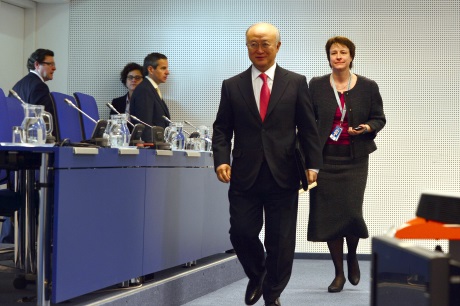Yukiya Amano has been reappointed as head of the International Atomic Energy Agency (IAEA) for a second four-year term by the agency's board of governors.
 |
| Amano arrives at the IAEA's press conference (Image: Dean Calma/IAEA) |
It was in December 2009 that Amano took the reins of the IAEA from former director general Mohamed ElBaradei. Amano's second term as director general will run from 1 December 2013 to 30 November 2017, and will be formally approved at the IAEA's general conference in September.
The announcement was made two days after Amano addressed the IAEA board at its first meeting of 2013, focusing on nuclear safety, nuclear energy and non-proliferation issues. Describing the two years since the Fukushima Daiichi plant as "challenging", he pointed to the continuous safety improvements being achieved at nuclear power facilities around the world as lessons learned from Fukushima and previous accidents are implemented. Speaking specifically of Fukushima, Amano said that the "worst elements of the accident are behind us and we are now in the post-accident phase."
The IAEA's latest review of nuclear technology showed that world nuclear capacity had increased in 2012 after a post-Fukushima drop in 2011, with the United Arab Emirates (UAE) becoming the first new country in 27 years to start building a nuclear power plant. First concrete was poured at the Barakah site in July 2012, and Amano commented on the "impressive progress" made at the site which he observed during a visit in January.
Moving on to non-proliferation matters, the director general expressed deep regret at the 12 February announcement by North Korea that it had conducted a third nuclear weapons test, and reiterated calls for the country to fully comply with its obligations under the Nuclear Non-proliferation Treaty (NPT).
Amano issued similar pleas for cooperation to Iran and Syria. He confirmed that Iran has recently started installing the more advanced IR-2m centrifuges at the Natanz fuel enrichment plant. Without Iran's full cooperation the agency was unable to conclude that all of the country's nuclear materials were in peaceful activities, he noted, repeating pleas for the IAEA to be granted access to the Parchin military site as well as for Iran to take steps towards the full implementation of its safeguards agreement with the IAEA.
Syria was also urged by Amano to fully cooperate with the agency in connection with unresolved issues related to the Dair Alzour site, allegedly the site of an undeclared reactor destroyed by an Israeli air strike in 2007.
Researched and written
by World Nuclear News




_83147.jpg)
_87299.jpg)
_52351.jpg)







